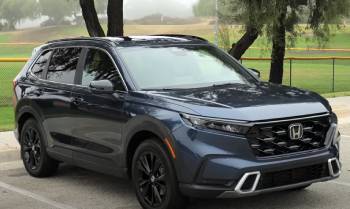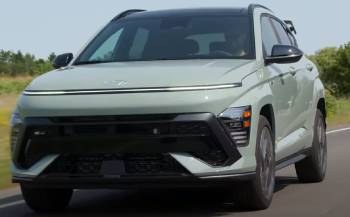You’re on the hunt for the perfect compact SUV, and two names have caught your eye—Honda CR-V and Hyundai Kona.
You’re not alone; these two rides are tearing up the road with their own sets of die-hard fans. But which one is really your dream machine? Here’s the scoop.
A Brief Comparison Table
| Feature | Honda CR-V | Hyundai Kona |
| Engine Options | 1.5L Turbocharged 4-cylinder | 2.0L 4-cylinder, 1.6L Turbocharged |
| Fuel Efficiency | High (especially in hybrid) | Good but generally lower |
| Interior Space | Ample passenger and cargo space | More confined space |
| Tech Features | Apple CarPlay, Android Auto, Honda Sensing | Apple CarPlay, Android Auto, Hyundai SmartSense |
| Warranty | 3-year/36,000-mile basic, 5-year/60,000-mile powertrain | 5-year/60,000-mile basic, 10-year/100,000-mile powertrain |
| Starting Price | Generally higher | Generally lower |
| Sportiness | Less sporty | More agile and sporty |
| Design | More conservative | Unique and eye-catching |
Honda CR-V: The Tried-and-True Classic

Pros:
- Dependability
Let’s start with what the Honda CR-V does best: reliability. Honda has a longstanding reputation for building vehicles that last, and the CR-V is no exception. This is the car you buy when you don’t want to worry about frequent repairs or breaking down on a lonely highway.
- Space and Comfort
The Honda CR-V is spacious, giving you a cavernous interior that’s a godsend on long trips. Ample cargo space means you can stash everything from luggage to camping gear with ease.
- Fuel Efficiency
The CR-V’s mileage figures are impressive. Whether you’re zipping through city streets or cruising on the highway, this SUV is designed to make every gallon go the extra mile.
Cons:
- Pricing
Honda CR-Vs aren’t exactly cheap. The starting price is higher than the Hyundai Kona, which might be a sticking point if you’re on a budget.
- Less Sporty
If you’re looking for a sportier, more agile ride, the CR-V might not be your best bet. It’s built for comfort, not for speed.
Also Read: Differences Between Hercules H/P 4000 And Cooper Cobra Tires.
Hyundai Kona: The Daring Upstart

Pros:
- Affordability
The Hyundai Kona is generally more budget-friendly than the Honda CR-V. With a lower starting price and various trim options, there’s likely a Kona that fits your financial landscape.
- Zippy Performance
With its turbocharged engine options and sporty handling, the Kona gives you a spirited driving experience. It’s a pleasure to drive, especially if you enjoy feeling connected to the road.
- Unique Styling
Let’s face it; the Kona has a unique, eye-catching design. If you’re looking for a vehicle that stands out from the crowd, this might be it.
Cons:
- Limited Space
The Kona is noticeably smaller than the CR-V, both in passenger and cargo space. While it’s cozy, you’ll feel the pinch on longer drives or when you need to haul larger items.
- Shorter Track Record
Hyundai is still building its reputation for reliability. While the Kona’s ratings are promising, it doesn’t have the long-standing track record of the Honda CR-V.
Key Differences Between Honda CR-V and Hyundai Kona
Alright, so we’ve given you the rundown of what makes these two cars rock, but let’s drill down into the nitty-gritty. Because let’s face it, you’re not just looking for a good car; you’re looking for the best car for you. Below are some of the critical differences that might just make your decision a whole lot easier.
Engine Performance and Powertrain
- Honda CR-V
The CR-V generally offers a 1.5-liter turbocharged 4-cylinder engine, providing ample horsepower and torque. It’s not going to break any land-speed records, but it’s designed for smooth acceleration and a comfortable ride.
- Hyundai Kona
Depending on the trim, you could be looking at a 2.0-liter 4-cylinder or a more potent 1.6-liter turbocharged 4-cylinder. The latter gives you some serious pep, adding excitement to your daily commute or weekend escapade.
The Verdict: If you’re after a sportier, more exhilarating driving experience, the Kona, particularly with the turbocharged engine, is where you’ll want to be.
Fuel Efficiency
- Honda CR-V
One of the CR-V’s strong suits is its fuel efficiency. In most configurations, you can expect impressive mpg both in the city and on the highway, especially with the hybrid models.
- Hyundai Kona
While the Kona also offers good fuel economy, especially in its base models, it generally falls a bit short of the CR-V, especially if you go for the turbocharged versions.
The Verdict: If you’re pinching pennies at the pump, the Honda CR-V, particularly its hybrid variant, takes the cake.
Interior Space
- Honda CR-V
Here’s where the CR-V shines—interior space. This ride is like a cavern on wheels, with ample room for passengers and a generous cargo area. You can haul plenty of luggage, groceries, or camping gear without breaking a sweat.
- Hyundai Kona
The Kona, however, is a bit more on the snug side. While it’s got enough room for day-to-day commuting and short trips, you’ll start feeling the space crunch on longer drives or when loading up for that big weekend getaway.
The Verdict: If space is a big deal for you, the CR-V is your roomy chariot.
Tech Features
- Honda CR-V
Honda has loaded the CR-V with an array of tech features, including Apple CarPlay, Android Auto, and a user-friendly infotainment system. Safety-wise, Honda Sensing—a suite of advanced safety features—is available or standard on most trims.
- Hyundai Kona
The Kona isn’t lagging far behind, though. It also comes with a robust infotainment system, Apple CarPlay, and Android Auto. Plus, Hyundai’s SmartSense suite of safety features is available, offering similar functionalities to Honda Sensing.
The Verdict: It’s a draw on this front. Both cars offer robust tech packages that will keep you both entertained and safe.
Warranty and Reliability
- Honda CR-V
Honda has a solid reputation for building reliable cars, and the CR-V is part of that lineage. However, the warranty offering is somewhat standard—a 3-year/36,000-mile basic warranty and a 5-year/60,000-mile powertrain warranty.
- Hyundai Kona
Hyundai is still building its reputation for reliability, but it compensates with one of the best warranty packages in the industry—a 5-year/60,000-mile basic warranty and a whopping 10-year/100,000-mile powertrain warranty.
Also Read: Differences Between Goodyear ComfortDrive And MaxLife Tires.
Frequently Asked Questions (FAQs)
The Hyundai Tucson is considered the equivalent to the Honda CR-V in terms of size and features. Both are in the compact SUV category and offer similar amenities.
The closest equivalent to the Hyundai Kona in Honda’s lineup would be the Honda HR-V. Both are subcompact SUVs with similar features but different styling cues.
If you value affordability, sporty performance, and unique styling, the Hyundai Kona is worth considering. However, if you need more space and a proven track record of reliability, you may want to look elsewhere.
The Hyundai Kona has become popular due to its aggressive pricing, unique design, and high-quality features. It offers a lot for the money, making it a great value proposition.
Hyundai has improved its reliability in recent years and offers an impressive warranty, but Honda still holds the edge when it comes to long-term dependability.
As of my last update in September 2021, Honda has not discontinued the CR-V. It remains one of their best-selling models. However, models do get refreshed or replaced, so it’s best to check the latest information from Honda for any updates.
Wrapping It Up
Honda CR-V or Hyundai Kona? Your choice will depend on what you prioritize—be it space, reliability, sportiness, or affordability. Both offer fantastic packages, but with distinct pros and cons. Take these factors into account, maybe even go for a test drive or two, and let the road decide. Happy driving!
So there you have it—your detailed breakdown of Honda CR-V vs Hyundai Kona. No matter which way you lean, both vehicles have a lot to offer, but now you’ve got the insider knowledge to make an informed choice. Happy driving!



